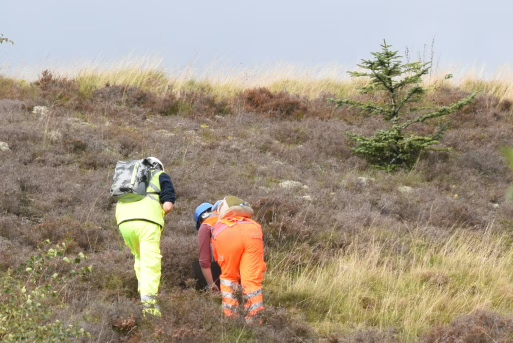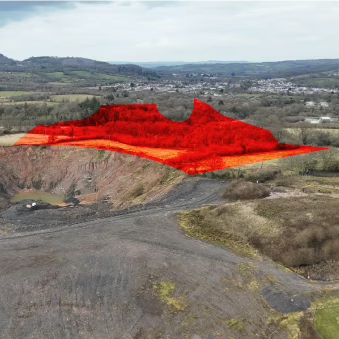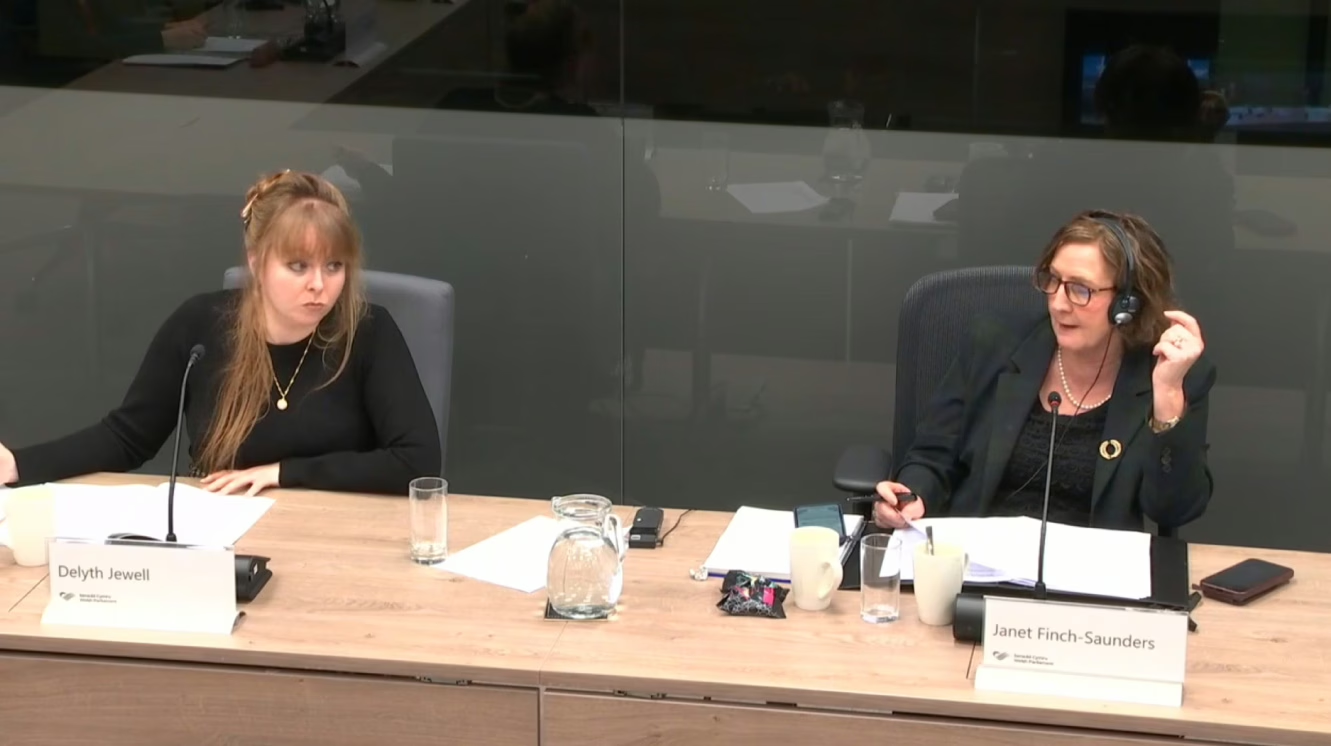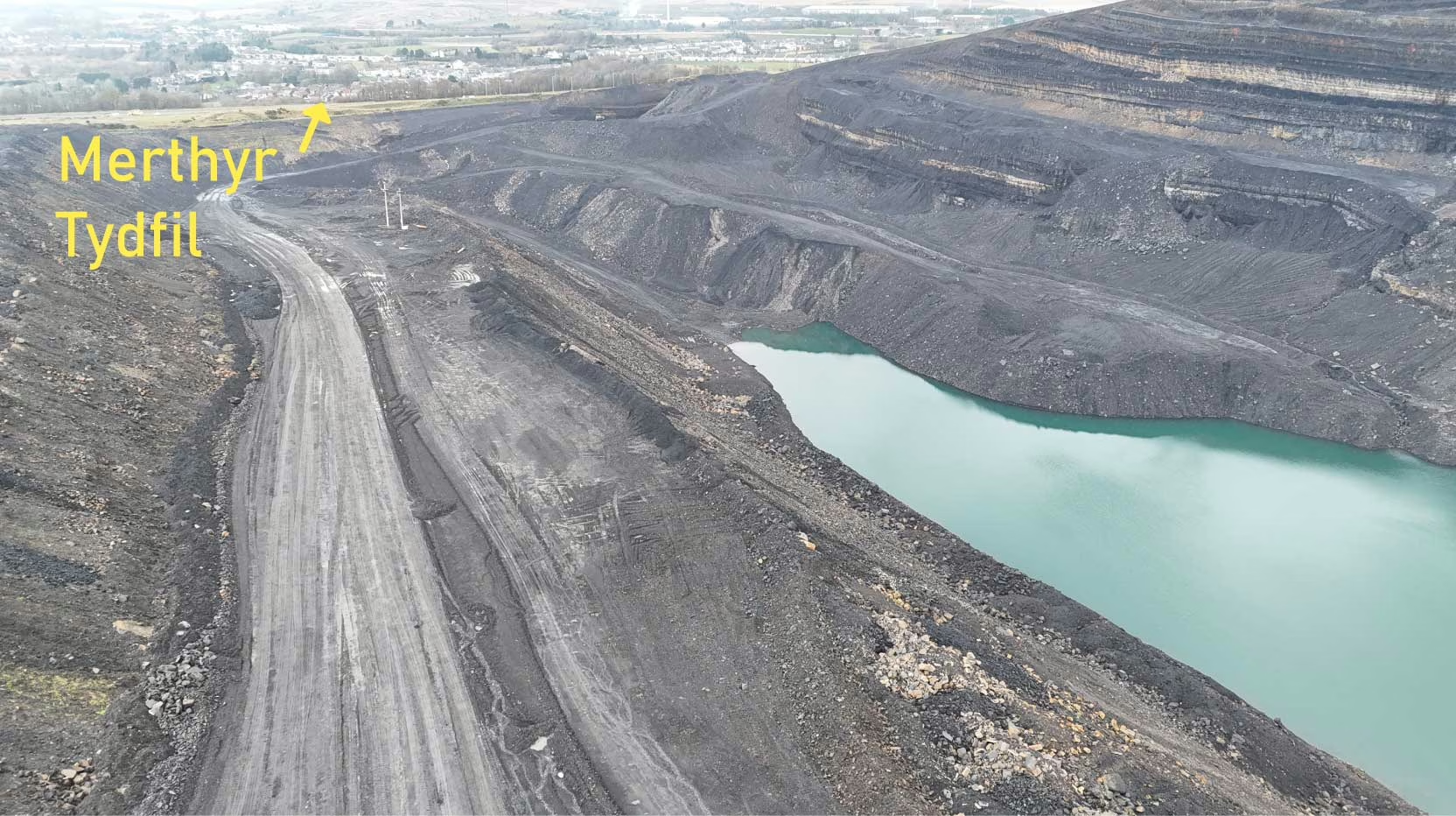This is what the 58,000 residents of Merthyr Tydfil face every day...and with a new plan by mining company, Merthyr (South Wales) Ltd, to evade its responsibility to restore the site, this risks becoming a permanent reality. This would set a dangerous precedent for other quarries and large infrastructure projects too, with other companies also flaunting planning control and conditions with impunity. The Welsh Government must bring this disreputable mining company to heel and deliver the restored, safe, and green landscape promised to Merthyr Tydfil and Commoners for over 16 years.
If you're a Senedd Member, see our brief for what you can do today.
Find out more about Ffos-y-fran opencast coal mine and join the campaign to get it restored.
Published: 02. 07. 2025
This information seeks to clarify which tips are included in ERI Ltd's proposal to mine and then flatten certain coal tips in Caerphilly. The tips selected appear to be on the basis of which would be most profitable to mine of the 'waste coal' they contain, rather than which most endanger residents. This is not surprising as the proposal is being brought by a for-profit mining company, but it does differ from how the company is presenting itself as an expert in remediation rather than mining.


Tip 90319 that most concerns residents is closest to them - it backs onto the gardens of some residents. It's also a site with concerns surrounding possibly toxic elements contained within the tip. Due to its proximity to residents, it's also seen a higher proportion of intentionally set fires that the fire service has been called out for compared to the other tips sited further away. There are also more tangible signs of the tip's industrial past and ongoing monitoring than the other, more naturalised tips. If the priority was to remediate the coal tips, this tip would be prioritised. Instead, this tip has been excluded from ERI Ltd's proposal to mine coal tips, with the promise to use some of those profits to then flatten the coal tips and remediate the area.
Despite the concerns around toxic elements in tip 90319 and the visible industrial heritage of the site, there are signs of nature slowly returning to the area. It's vital that any measures to remediate this coal tip - or any others - in future take full stock of the nature that has regrown. If there are legitimate safety risks, though, this must be prioritised.

The Welsh Government's Deputy First Minister, in his response to the CCEIC’s Stage 1 Report, admits The Disused Mine and Quarry Tips (Wales) “Bill does not prevent the extraction or burning of coal” but adds “I cannot envisage a scenario in which the extraction and burning of coal will arise as a result of the Bill”. We see a clear and significant potential for the Bill to encourage the extraction of coal from coal tips for profit by the private sector, encouraged by land owners with concerns about ongoing maintenance costs, to be sold for polluting but non-energy uses.
We want to see the Deputy First Minister demonstrate his commitment to ensure the Bill does not have this unintended consequence by including on the face of the Bill an amendment that “That any coal extracted during remediation work cannot sold where there is any possibility of that coal being combusted, on the grounds that this will contribute to the climate change which the Bill acknowledges will increasingly threaten the stability risk of coal tips moving forward”.
Although the Disused Mine and Quarry Tips (Wales) Bill creates no new responsibilities additional to what is contained within the Mines and Quarries (Tips) Act 1969, it does both make potentially costly tip maintenance more enforceable and lowers the threshold to act for better prevention of tip instability.
The typical private land owner or even Council may welcome or encourage a proposal from the private sector to flatten the coal tip at no cost to them, rather than face higher ongoing maintenance costs relating to coal tip stability as a result of the above two features of the Bill. These costs can amount to millions of pounds. Although there has been a keenness to distinguish coal tip remediation from the coal tip safety monitoring and works that this Bill is concerned with, the reality is that this distinction blurs when remedial works can remove stability issues moving forward.
Caerphilly Council spent £1.8m across two coal tips (T10817 and T36144) on routine maintenance and preventative measures over just two years (2021-23). NRW responded to the CCEIC’s consultation, saying the Bill “underestimates the costs of compliance for tip owners”.
The Leader of Caerphilly County Council, in March 2025, wrote in relation to a proposal to mine two Bedwas coal tips by ERI Ltd:
“The risk of the tip is a current and real issue that is managed constantly by the infrastructure team, doing nothing is not an option… The project is designed to use the value within the land to address a risk for which it bears the responsibility to address. In return CCBC receive an asset in the form of a reclaimed tip with reduced maintenance liabilities that will be open to residents of the borough.”
This example is not in isolation either, “Andrew Morgan (WLGA) told the Committee that Rhondda Cynon Taf County Borough Council (CBC) was regularly contacted by private companies with offers to remediate disused tips owned by the council” – p.50, Stage One Report.
The Coal Policy Statement of March 2021 cites that wholly exceptional applications for coal extraction would be considered if they could demonstrate why extraction is needed to “ensure the safe winding-down of mining operations or site remediation.”, amongst other criteria that could also apply to coal tip-remining projects.
The Coal Licencing Ban currently under formulation by the UK Government will also fail to catch such applications as they do not require a licence, only planning permission.
The Hardship Grant Scheme for landowners only exists where those landowners are unable to afford maintenance works, not for those who are technically able to but would struggle to, or understandably prefer to avoid, this new significant financial burden.
To ensure the Bill does not have this unintended consequence, we ask the Cabinet Secretary for Climate Change and Rural Affairs to reconsider including on the face of the Bill an amendment that “That any coal extracted during remediation work cannot sold where there is any possibility of that coal being combusted, on the grounds that this will contribute to the climate change which the Bill acknowledges will increasingly threaten the stability risk of coal tips moving forward”.
This is an amendment supported by the Welsh Local Government Association in its consultation with the CCEIC, civil society (including consultees Coal Action Network and FOE Cymru), and the CCEIC itself in its Stage 1 Report.

Although the UK entirely removed coal from its electricity generation with the closure for Ratcliffe Power Station in October 2024, it continues to rely on coal in a number of industries. The UK must rapidly decarbonise these carbon-intensive industries to meet its climate commitments. Click on the tabs below to find out about each industrial application of coal.
 WORLDWIDE
WORLDWIDE
The direct use of coal as a feedstock (not just energy) is particularly significant in China, where coal is used extensively in coal to gasification plants to produce chemicals such as methanol, ammonia, and polyvinyl chloride (PVC). In 2017, China's chemical industry alone used about 180 million tonnes of coal as feedstock, which constituted about 5% of China’s total coal use that year.
China is unique in its heavy reliance on coal for chemical manufacturing, accounting for a large share of global coal-to-chemicals production. For example, 89% of methanol and 76% of ammonia production in China is coal-based, and producing 1 tonne of methanol from coal requires about 2.7–3 tonnes of coal.
India is also expanding its coal gasification capacity, with government plans to gasify 100 million tonnes (MT) of coal annually by 2030
In contrast, other major chemical-producing regions (Europe, North America, Middle East) primarily use natural gas or crude oil as feedstocks rather than coal.
UK
There is negligible or close to zero coal gasification industry in the UK as of 2025: over the past 20 years, gasification projects have focused on waste or biomass, rather than coal.
![]()
WORLDWIDE
Global brick production was estimated at 2.18 billion tonnes in 2020, resulting in approximately 500 million tonnes of CO2e (1% of current global GHG emissions). Brick production could rise to 3.35 billion tonnes by 2050. Approximately 375 million tonnes of coal are used globally per year in brick production, mostly as fuel to heat kilns. Research indicates that coal is added to clay bricks at rates of 1–15% by weight of the clay mixture.
Switching from coal to alternative fuels, together with more efficient kilns, will lead to reduced CO2 emissions.
UK
Heating brick-firing ovens in the UK uses a mix of natural gas, electricity, coal and coke, diesel and LPG fuels. The primarily for use of coal in bricks, though is as an additive to colour it. According to coal mining company, Energybuild Ltd, UK brickworks consume approximately 70,000 tonnes per year of additives, which includes coal.
Annual tonnage of anthracite coal used by the UK brickmaking industry is not made public but the proportion used within the UK generally falls within the range of 1–5% of the brick mix by weight, depending on the desired product characteristics. This contributes to the high emissions released from the raw brick materials upon firing.
![]() WORLDWIDE
WORLDWIDE
Activated carbon is typically made from charcoal (wood) and is a common filtration medium in water treatment systems. It can be manufactured from other sources, with anthracite coal being a common source. Alternatives include nutshells. These sources are first processed into activated carbon through high-temperature treatment to create a porous structure suitable for adsorption
The global market for coal-based activated carbon was valued at approximately USD 4.44 billion in 2024, with demand driven by applications in air purification and water treatment.
Alternatives to the traditional sand/activated carbon dual medium to filter water include glass, garnet, magnetite, and other materials.
UK
The exact annual tonnage of anthracite coal used by the UK water filtration industry is not made public but it does use both domestically mined and imported coal.
 WORLDWIDE
WORLDWIDE
The cement industry consumes around 4% of global coal production, which amounts to approximately 330 million tonnes per year. Most of this coal is combusted to generate the heat required to fire the kilns to about 1450c to create the chemical reaction that produces cement. Roughly 0.5 tonnes of coal are needed to produce 1 tonne of cement.
Coal in cement production is primarily used as a fuel to heat kilns, and the burnt coal ash can also serve as a minor feedstock into the clinker. Fly ash and blast furnace slag (both waste coal products) are used as a substitute for clinker in cement production, and can increase the concrete durability. By using substitutes for kiln-based ‘clinker’ in cement production, the cement industry can significantly reduce its carbon footprint. Post-consumer waste can also be used as an alternative fuel to reduce the coal used to heat the kilns, helping to decouple coal from the cement industry.
UK
Of the cement sold in the UK in 2024, 33% was imported. UK cement manufacture has begun switching from traditional fossil fuels such as coal and pet-coke to the use of waste, waste biomass and waste part- biomass fuels. These alternative fuels now account for 43 per cent of the fuel used (2020), replacing the equivalent of half a million tonnes of coal every year. This means 1.16 million tonnes of coal would be used if it weren’t for replacement fuels, and 660 thousand tonnes of coal is still used in UK cement manufacture.
UK carbon dioxide emissions from concrete and cement were 7.3 million tonnes in 2018; around 4.4 million tonnes of this was ‘process emissions’ from clinker production, 2.2 million tonnes from fuel combustion, and the remainder from electricity use and transport. Owing to decline in cement production and increases in efficiency, the sector's direct and indirect emissions are 53% lower than 1990. UK concrete and cement accounted for around 1.5% of UK carbon dioxide emissions in 2018. UK Government research and commercial examples from around the world indicates that the elimination of fossil fuels is possible with no negative impact on clinker quality, kiln stability or build-up issues.
![]() WORLDWIDE
WORLDWIDE
The steel industry produces 9-11% of the annual CO2 emitted globally, contributing significantly to climate change. This is largely due to the reliance on coking coal in primary steel production. 4 of the 5 biggest global steel producers aim to reach carbon neutral steel production by 2050, using green hydrogen instead of coal.
UK
Scunthorpe Steelworks still relies on coal-based steel production, and is the second biggest single site emitter of CO2 in the UK. Port Talbot steelworks recently closed to convert to using electricity to recycle scrap steel, decoupling it from coal inputs. The other two large steel producers – Liberty Steel and Celsa also recycle scrap steel in ‘electric arc furnaces’.
To keep up with global decarbonisation trends, Scunthorpe steelworks needs to decarbonise as well. If not, customers aiming to reach their own climate goals will likely choose to import lower carbon steel from other European countries like Sweden and Spain who are pursuing low-emissions steelmaking projects.
Read more about coal in steel in our 2021 report.
![]() Graphite is a naturally occuring substance used in everything from pencils to batteries. Anthracite is one of several suitable carbon-heavy materials that can be used to make artificial graphite. If anthracite is used to make artificial graphite, it must be heated to extreme temperatures of 1,000c for ‘baking’ and up to 4,000c for ‘calcination’ to remove impurities making up 8% of the anthracite. This stabilises the artificial graphite end product. The heating would release greenhouse gasses in a similar way to if it were burned for household heating.
Graphite is a naturally occuring substance used in everything from pencils to batteries. Anthracite is one of several suitable carbon-heavy materials that can be used to make artificial graphite. If anthracite is used to make artificial graphite, it must be heated to extreme temperatures of 1,000c for ‘baking’ and up to 4,000c for ‘calcination’ to remove impurities making up 8% of the anthracite. This stabilises the artificial graphite end product. The heating would release greenhouse gasses in a similar way to if it were burned for household heating.
This process can be avoided by using natural graphite and scrap graphite. The UK doesn’t manufacture any artificial graphite and UK demand is also relatively low: “UK is a small net importer of natural and synthetic graphite”.


This nature was photographed around 50 metres from the edge of the Glan Lash opencast coal mine in Ammanford, South Wales. It shows the thriving ecosystems surrounding the Glan Lash opencast coal mine which has remained dormant since 2019. All the nature photographed would be killed and destroyed if Bryn Bach Coal Ltd get their application to extend the coal mine, approved. We're resisting this extension, you can too.
But this space is dedicated to celebrating the lush and undisturbed ecosystem currently here. Long may it remain so.







In February, CAN gave oral testimony to the Climate Change, Energy, and Infrastructure Committee (CCEIC) on the Disused Mine and Quarry Tips (Wales) Bill. Alongside FOE Cymru, we gave a candid account of the strengths, weaknesses, and pitfalls of the Bill. Watch our session in full.
The CCEIC is the first committee scrutinising The Disused Mine and Quarry Tips (Wales) Bill passing through the Senedd, giving it significant scope to shape the Bill at an early stage. CAN successfully persuaded the CCEIC during our oral testimony to make key recommendations to the Welsh Government to improve the Bill in its Stage 1 report:
The Welsh Government should provide further assurance that:
Coal Action Network was invited to attend Westminster where we gave evidence to the Welsh Affairs Committee in their inquiry about the environmental and economic legacy of Wales’ industrial past, alongside Friends of the Earth Cymru.
This inquiry was opened in December 2024 to examine the environmental legacy and economic impact of Wales’ historical heavy industries. You can find our written evidence here.
In our submission, we focused on the consequences today of old coal mines. Whilst we recognise the wealth it generated, much of that was kept by the Directors of mining companies whilst abandoning their restoration responsibilities to host communities. Our 2022 report ‘Coal mine restoration in South Wales’ documents this pattern in Wales’ recent past. We also highlighted the threat of new coal mining under the guise of remediation, as proposed in Bedwas, South Wales.

Merthyr (South Wales) Ltd operates the recently closed sprawling Ffos-y-fran opencast coal mine, next to the town of Merthyr Tydfil - home to around 58,000 people. In 2015, Merthyr (South Wales) Ltd agreed a restoration plan with Merthyr Tydfil Council, which - after coal mining ended - would see the landscape put back to before coal mining began and with extensive habitat improvement to support nature to return to the area. But as soon as Merthyr (South Wales) Ltd saw there was no more profit to be made, it claimed that it had failed to set aside enough of its profits to fund the restoration plan it agreed to deliver back in 2015. Rather than taking Merthyr (South Wales) Ltd to court over what would be a breach of contract and trust, Merthyr Tydfil Council invited the company to gut that restoration agreement by around £85 million in works, and with no punitive action against the company. This is despite all public records indicating Merthyr (South Wales) Ltd actually can afford the original restoration plan.
Within the last decade, Celtic Energy Ltd - another mining company, evaded well over £100 million in restoration costs and made a high quality restoration impossible at 4 opencast coal mines across South Wales. Communities living close to these sub-standard restorations still pay the price for Celtic Energy Ltd's profiteering. In fact, the Welsh landscape is littered with over 2,500 coal tips - abandoned by coal mining operations and now forming a huge burden estimated to cost £600 million to deal with.
Merthyr (South Wales) Ltd's attempt to evade the cost of the restoration it agreed to at Ffos-y-fran is therefore just the most recent instance of an industry that continues to cost some of the poorest communities in South Wales more than it ever gave them. But all is not lost for the 58,000 residents of nearby Merthyr Tydfil. We're standing alongside vocal campaigners in the area against this attempt by Merthyr (South Wales) Ltd to short-change the town of Merthyr Tydfil by £91.2 million in restoration funds. You can help us by taking 2 min to object to this application on the local council's website.
Restoration plans are supposed to return the land back to a better state than before coal mining began. In reality this rarely happens, but it somehow still convinces planners to grant permission for mining. The new plan to downgrade the restoration tries to shift this 'baseline' state of the land by 17 years from before coal mining began to just after coal mining stopped. This is so the new restoration downgrade only has to improve a Mordor-like landscape ravaged by 16 years of coal mining, drastically lowering the threshold. But there's no justification for setting this new starting point.
The new downgrade proposes to permanently leave huge health and safety hazards in a landscape that is in easy walking distance from the population of Merthyr Tydfil, even encouraging the public into this area. There are tangible risks to life and limb from a very deep flooded void, to a sheer cliff edge and massive coal tips, one of which has already suffered large slip. All of these hazards are supposed to be removed from the landscape at the end of coal mining, but Merthyr (South Wales) Ltd is putting its profits before people's lives.
The flooded quarry, Dorothea in Talysarn, Gwynedd is an abandoned quarry left in a similar state to what is now being proposed for Ffos-y-fran. But since 1990, there's been over 20 tragic deaths at Dorothea quarry.
3 colossal coal tips were supposed to be removed at the end of coal mining but the coal company wants to leave them where they are, despite the fact they leach toxic metals into the surrounding ecosytem, which it admits is home to protected Great Crested Newts. To make it worse, one of the many cuts to the previously agreed restoration plan is to stop maintaining the ponds which capture "chemical loads" from rainwater running off the colossal coal tips, admitting that they may 'silt up', which would potentially harm the endangered Great Crested Newts, as well as spread the "chemical loads" further into rivers and streams.
In one of the most blatant greenwash attempts we've seen in a while, this coal company suddenly cares deeply for minimising CO2 emissions. This, it claims, is why it proposes to leave the 37 million cubic metres of mine waste, soil, and rocks in the three massive dumps its created, rather than refill the opencast void with it - as was the original plan. Earth-moving requires HGVs burning deisel... but the emissions spared by leaving behind 3 colossal coal tips overshadowing 58,000 people would amount to just 2% of the illegal coal mining Merthyr (South Wales) Ltd did over 15 months after its planning permission expired. If the void is filled in with the coal tips, it'll also provide a greater carbon sink cancelling out that CO2 of these earthworks even more. This isn't about CO2, its about money - which Merthyr (South Wales) Ltd want to turn into even greater profits.
One of the main cuts to the original restoration plan is to leave 37 million cubic metres of mining waste, soil, and rocks in 3 colossal coal tips scattered around the site and towering above nearby residents of Merthyr Tydfil by up to 210 metres, disfiguring the landscape forever. One of these coal tips, nearest to residential homes, has already suffered instability with a recent and large coal tip slip 2024. The combined pressures of climate change, illicit scrambler bikes, and time could create further instability and dangers.
Many coal tips require regular maintenance and all disused coal tips must be monitored for instability. Long after the coal company, Merthyr (South Wales) Ltd, has left with its tens of millions in profits, there will be ongoing maintenance costs likely to amount to millions and likely to be funded by tax payers.
Against official guidance, the aftercare period being proposed for nature restoration is just 5 years. Guidance recommends double this to 10 years to ensure tree and hedge plantings are successful before the coal company is allowed to wash its hands of responsibility. 5 years does not give long enough to see what plantings need to be replaced and to support the growth of those - instead, failed plantings will either be abandoned or the tax payer will have to pay for replanting and maintaining those areas.
Prior to opencast coal mining, the area formed part of the Gelligaer and Merthyr Common, an upland area of rough grassland grazed by sheep, cows and horses. Commoning is a way of life with a rich history dating back to 1066 and enshrined in the Magna Carta (1215).
The cuts to the original plan mean leaving behind a huge flooded mining void and 3 colossal coal tips. This will severely reduce the ability for Commoners to exercise their historic rights to graze their animals on the land. It also represents a broken promise to return this land to the Commoners after coal mining. Instead, the hazards that would be left behind pose risk of injury and death to the Commoners' livestock.
A whole way of life and a living part of our history is threatened by the cuts proposed to the original restoration plan, as well as the preservation of native Welsh breeds of sheep and cows like the South Wales Mountain Sheep, or Welsh Black cows.
Through the thick layer of greenwash, the real reason for trying to cut every corner on the original restoration plan is admitted by the company's representative: "It was established that there are insufficient funds available to achieve the 2015 restoration strategy and therefore an alternative scheme is required.". But it's a matter of public record that this is not true, with £91.2 MILLION set aside by the company to fund the original restoration plan. Merthyr (South Wales) Ltd even claimed tax discounts on this from HMRC.
We were invited for the second time to give oral evidence to the Climate Change, Environment, and Infrastructure Committee of the Welsh Parliament (Senedd) on 05th February 2025. We shared the panel with Haf, Director of FOE Cymru, to provide our opinion on the weaknesses, strengths, and improvements that need to happen for the Disused Mine and Quarry Tips (Wales) Bill to deliver real benefits for Welsh people living in the shadow of coal tips.
We emphasised that the The Disused Mine and Quarry Tips (Wales) Bill, in its current form, carries the very real risk that it could encourage 'remining' so-called waste coal from coal tips under the guise of making those coal tips safe. There is a live proposal to do exactly this for two coal tips in Bedwas, Caerphilly. Read more about coal tip re-mining and safety.
Our message to the Senedd Committee: include a provision in this new Bill prohibiting coal extraction for commercial gain from disused coal tips.
Watch our session with the Committee to find out how the pros and cons of the new Bill, not least encouraging 'remining' coal tips which contain up to 643 million tonnes of coal, emitting up to 1.7 BILLION tonnes of CO2.
In April 2024, we were invited to give oral evidence on Welsh coal mine restoration, with a focus on Ffos-y-fran opencast coal mine. Check out this video of our debut session with the Climate Change, Environment, and Infrastructure Committee.
Mining company: Merthyr (South Wales) Ltd (MSW) is the current operator of the sprawling opencast coal mine, Ffos-y-fran, in Merthyr Tydfil, South Wales.
Claim: MSW claims "It was established that there are insufficient funds available to achieve the 2015 restoration strategy and therefore an alternative scheme is required." (EIA Scoping Report, July 2024). It is on this basis that a new application will be considered by Merthyr Tydfil County Borough Council.
MSW's 'solution': To downgrade the restoration scheme promised to surrounding communities to one that amounts to doing as little as possible. Even returning the tens of millions of cubic metres of coal tips to fill in the gaping void the company created and allowed to flood is considered "not feasible or economic" (EIA Scoping Report, July 2024)
Why MSW is offering to do any works: Merthyr Tydfil County Borough Council holds £15 million in an Escrow account that it forced MSW to pay into (by court order). This was never intended to fund the original restoration agreement costed at £75-120 million, but that is what's happening now as MSW is claiming the company doesn't have the finances to pay for the restoration it previously agreed to fund. MSW wants this £15 million so is proposing a massively downgraded restoration plan and presenting this as the only option so the Council will pay this out to them. The Council is afraid the company will walk away if it is compelled to honour its contractual agreement to fund the restoration itself. If that happens, the Council would have to pay a new company to come in to restore the site, which'd cost more.
Our recommendation: Merthyr Tydfil County Borough Council has refused to pursue MSW to deliver on the contractually agreed level of restoration, and is poised to consider a downgraded plan by MSW which would affect surrounding communities living in Merthyr Tydfil for generations. Haven't they put up with enough after 16 years of coal mining, dust, and noise pollution? The Welsh Government urgently needs to launch an inquiry MSW finances and the Council's actions, issuing a 'holding directive' to prevent the Council approving the downgraded plan in the meantime.
To our knowledge, there has been no evidence submitted by MSW that it cannot fund the full restoration it is contracted to undertake. On the contrary, MSW's most recent, publicly available, financial statement on Companies House says "during the year the directors again reassessed the restoration provision based on current operating costs in particular diesel prices which have decreased significantly and increased plant hire costs, which as a result increased the restoration provision by £0.2m to £91.2m", by 31 Dec 2023, admitting record profits the year before, with its ultimate parent company, Gwent Holdings Ltd, reporting "The average coal price achieved increased by 94% to £151.66 per tonne" in its 2022 filing. This funding for restoration was based on Ffos-y-fran closing at the end of its planning permission in September 2022 - but it continued illegally mining coal for over a year after that, and even outside its licenced area, selling an extra 640,000 tonnes of coal - driving profits even further.
It's been claiming tax discounts to HMRC each year by phasing expected restoration costs that it now refuses to pay. This report goes on to say "The total costs of reinstatement of soil excavation and of surface restoration are recognised as a provision at site commissioning when the obligation arises. The amount provided represents the present value of the expected costs.".
This very much sounds like the company able and prepared to pay the restoration costs, and had already claimed tax discounts for it. So why is the company being allowed to duck tens of millions in what it owes?
As is typical of the mining industry, operations and financing is done through a complicated constellation of interconnected companies owned by family members (depictions of which are illustrative only and not based on any likeness). This kind of practice could help evade liabilities - though we're not suggesting that was the intention here. The following information is accurate to the best of our knowledge, please refer to Companies House for confirmation/further details:



David Lewis has already been convicted of criminal fraud, with Judge Durham-Hall telling Lewis: "When the truth was put before you you wriggled, twisted and whinged" and described Lewis as "a pathological gambler who demonstrated pathological dishonesty", concluding "What he did was unlawful, crass, stupid and dishonest." *we believe this article refers to the same David Lewis that is currently Director of MSW but will consider evidence to the contrary, so get in touch before you threaten to sue us again David 😉